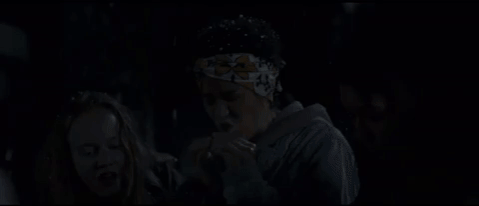
Grief is a complex emotion, and processing those feelings can be a challenge under normal circumstances. Suffice to say, the high school girls soccer team on Yellowjackets has found itself in a rather unconventional scenario: stranded in the Canadian wilderness, where they must brave the elements (and one another) for 19 months before being rescued. It’s in these distressing conditions that Shauna (played by Sophie Nélisse in the earlier timeline) has to contend with losing her best friend, Jackie (Ella Purnell), who froze to death after the two had a huge falling-out in the Season 1 finale. (One of the catalysts for their fight was Jackie discovering that Shauna had been sleeping with her boyfriend, Jeff, whom Shauna is married to as an adult.) Jackie’s tragically avoidable demise—cause of death: hypothermia and teenage pettiness?—might not be the biggest turning point in a series whose characters resort to forming cannibalistic clans, but it’s a meaningful, devastating step toward the inevitable fracturing of the group.
When Season 2 picks up with the Yellowjackets, two months have passed since Jackie’s death. The survivors have been subsisting on bear meat after a grizzly seemingly offered itself as a sacrifice to Lottie (Courtney Eaton)—her whole Supernatural Gwyneth Paltrow vibe is one of the show’s many lingering mysteries—but food stores are beginning to run low. Since it’s the middle of winter, Natalie (Sophie Thatcher) and Travis (Kevin Alves) haven’t been able to hunt any game. Meanwhile, Shauna’s been assigned to divvy up bear rations, all while engaging in imaginary conversations with Jackie. If that sounds concerning, just wait until you see how it looks:

You have to feel for Shauna, whose guilt over her bestie’s death has manifested in a hallucination that preys on her own insecurities. “You’re not the only smart one, you just like to think you are,” Imaginary Jackie tells Shauna in Season 2’s second episode, “Edible Complex.” (As for why the Yellowjackets haven’t disposed of her body after all this time, well, the ground is literally frozen.) In the midst of dealing with her grief like Norman Bates, Shauna takes a bite out of Jackie’s severed ear in the final moments of the Season 2 premiere, marking the first time in the Yellowjackets timeline when a character consumes human flesh.
Shauna doesn’t hold that distinction for long. After the team discovers that Shauna’s not only hanging out with Jackie’s corpse, but also applying makeup and braiding her hair—[laughing nervously] what the fuck?—they decide to cremate their dearly departed captain. Unfortunately, nature or supernatural forces intervene, and a huge gust of wind knocks a bunch of snow from the branches above onto Jackie’s body. The cooling snow and steam keep her from being cremated and allow her to slow cook like a tender brisket.
Waking up in the middle of the night to the smell of perfectly sizzled flesh, the girls and Travis convene around the body. “She wants us to,” Shauna says before taking the first chomp into Jackie’s corpse, which now more closely resembles the alien from Annihilation. With the exception of a horrified coach Ben (Steven Krueger), whose survival in the show is looking more precarious by the episode, the gang go into a feeding frenzy. The revolting scene is juxtaposed with the characters in ancient Greek attire and presiding over a lavish feast, which had the undesired effect of making me want to fast until the end of time:

If Shauna munching on her best friend’s ear in the Season 2 premiere was the “baby step toward the cannibalism,” as Yellowjackets cocreator Ashley Lyle told Variety, then the Jackie buffet in “Edible Complex” marks the point of no return. For the characters, it’ll be easier to justify future forays into cannibalism after Jackie’s corpse provided them some much-needed sustenance when they were running out of food. Conversely, for a viewer, the horrific nature of the sequence speaks for itself. But perhaps we shouldn’t be so quick to pass judgment on the Yellowjackets, at least not for this particular helping of long pig.
In almost any context, cannibalism is understandably taboo, even if it’s not strictly illegal in some parts of the world. In the United States and Canada, few laws explicitly prohibit the consumption of human flesh—there are more restrictions around how one would procure the meat in the first place. (One notable exception is the state of Idaho, where anyone found guilty of cannibalism can face up to 14 years in prison.) But it’s not like the Yellowjackets have other options available to them: Natalie and Travis can’t find anything to hunt, and vegetation is very limited, if not nonexistent, in the dead of winter. In the spirit of Jeff’s favorite Papa Roach song, eating Jackie was their last resort.
Besides, there’s a real-life precedent for a sports team crash-landing in the middle of nowhere and eating their teammates to survive. The initial premise of Yellowjackets shares some similarities with the Andes flight disaster of 1972, in which a plane carrying a Uruguayan club rugby team, along with their families and supporters, crashed into the Andes Mountains. (The harrowing incident was also adapted into a film released in 1993, Alive, starring Ethan Hawke.) The survivors spent 72 days in the Andes and barely had any rations to go through before being forced to mull the other option. “We knew the answer, but it was too terrible to contemplate,” one of the players, Roberto Canessa, wrote in his book recounting the experience. With nowhere else to turn, the survivors began eating the bodies of their companions until they were rescued. (Of the 45 combined passengers and crew, 16 made it back alive.)
The Andes survivors feared how the public would react to the news of their cannibalism; thankfully, Canessa says they received plenty of support since it was known that it was the only available choice. Those concerns echo the present-day Yellowjackets’ fears about the repercussions if anyone found out what really happened in the woods, which would be especially damaging to Taissa Turner (Tawny Cypress in the later timeline), who was recently elected as a New Jersey state senator. But while there’s no excuse for hunting and ritualistically consuming your teammates—something that could rear its head by the end of the season—the Jackie dilemma is not unlike what the Andes survivors went through, only the Yellowjackets characters had far fewer reservations when push came to shove. Even then, it’s hard to blame the Yellowjackets for their sudden and intense cravings: They inadvertently created the wilderness’s greatest makeshift barbecue pit for Jackie’s body.
But considering that Jackie is the first of what should be several cannibalistic meals for the Yellowjackets, I couldn’t help but wonder: What does human flesh actually taste like? That’s why I decided to go on the dark web and procure my own—just kidding. Here’s how the late journalist and explorer William Seabrook described human meat after he convinced a medical intern at the University of Paris to provide him a sample: “It was so nearly like good, fully developed veal that I think no person with a palate of ordinary, normal sensitiveness could distinguish it from veal.”
With the understanding that I’d never consume human flesh and abstain from veal for ethical reasons: That actually sounds, uh, pretty tasty? At the very least, a veal substitute would be way more appetizing than the aged bear meat and shroom soup the Yellowjackets have been living on for the past couple of months. In other words, while it’s almost always inexcusable to consume a fellow human being, we should cut the team some slack for their cannibalistic transgressions when Jackie’s corpse provided them their most plentiful (and delectable?) source of food.
Unfortunately, Jackie may not keep the group full for long: When it comes to the caloric value of humans, we don’t pack the same punch as other sources of meat. According to the archaeologist James Cole, who researched the caloric significance of cannibalistic practices during the Paleolithic period, one body would give a group of 25 people only enough sustenance to last less than a day. (A woolly mammoth, by contrast, could keep the same group fed for two months—let’s keep those woolly meatballs coming.) The group of Yellowjackets survivors is around half the size of that group, so it’s safe to surmise that Jackie’s body has realistically given them two days—three, tops—without having to worry about their next meal.
Granted, the real problem on Yellowjackets isn’t that human meat needs to step up its calorie game: It’s what happens when the characters start hunting one another in search of their next meal. The ravenous consumption of Jackie is the gateway to acts of savagery that have only been hinted at on the series thus far. We’re that much closer to seeing the Yellowjackets at their very worst, and while eating Jackie’s corpse was a moment born out of genuine necessity, it’s also led the characters to acquire a taste for something they shouldn’t have ever tried.
